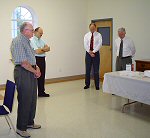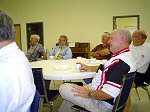Judge Robert Earl Wilters was the May 11, 2004 invited guest to Zion Lutheran Church's "Men's 710 Second Tuesdays," a monthly fellowship aimed at issues relating to the men of Baldwin County. Judge Wilters fielded a variety of questions related to delay of cases getting to trial, best interests of a client and justice, the process of decision-rendering by a judge, the independence of judges and the impact of fairness on decisions, the shift of law with time, the place of faith and God's guidance in making wise and valid judicial rulings, and the role of the electorate in selecting responsive judges reflecting its life style and life experiences.

Delay of Cases. Court cases may be trial-delayed for a number of reasons. Until parties are ready for resolution in a judicial proceeding, a judge can do nothing to resolve a case. Simply put, lawyers cannot be forced to go to trial. Of the 400 lawyers practicing in Baldwin County, the majority are reluctant to go to trial.

Client Interests and Justice. What is in the best interest of the litigants? A surface problem, the one that results in litigation, may only be symptomatic of a deeper issue. An attorney may address either the surface problem or the deeper one, but in the case of litigation, going to court represents the "last" resort for any client.

Process of Decision-Rendering. A judge's rulings fall into three categories. Things that are clearly "black" or "white" are not the problem, because the law is clear and limited judicial discretion is needed. These decisions are the ones that are seldom appealed. Judicial discretion is needed for the "gray" areas of the law. Judges are called on to be consistent in their rulings even in issues where judicial latitude is necessary. These judgments may be appealed. It is the "gray" areas that end up in the Supreme Court and even then, the Court seldom if ever has an unanimous interpretation of the point of law. "Gray" areas are open to interpretation; "black" and "white" areas of the law are not.

Independence of the Judiciary. Judges must be neutral and avoid taking sides. As arbiters, they recognize the ramifications of decisions. For example, the outcome of murder cases or even divorce cases will affect the lives of not only clients in court represented by attorneys, but also a host of other potential stake-holders not part of the proceedings. A judge must keep all in mind.

Shift of Law with Time. The law is not a stationary vehicle for resolution of society's ills. It is as if the law is alive and slowly growing, shifting, and changing. The judge must be with the vehicle, updating and noting change, in order to be a judge that works with people resolving problems brought to the courts for resolution.
Place of Faith. Godly wisdom and guidance has a place in a judge's life. God may be a resource to provide direction for action and guidance in leading to problem resolution. A judge has to be open to hearing God's advice if human problems are to be resolved.
Role of the Electorate. The State of Alabama is blessed by a judiciary that is appointed by ballot of the people. Voters must seek out judges who have life experiences that give them discretion for ruling on life issues, because a judge's rulings will affect the lives of the voters and their families. This Alabamian election process eliminates some of the problems inherent in appointment processes used in some other states. Such processes may minimize the needs of the people and limit how people can know their judges.
A product of Baldwin County, Robert Earl Wilters, is a graduate of Baldwin County High, the University of Alabama, and Cumberland School of Law He has a background in the practice of law, law enforcement, and county prosecution, as well as in the judiciary of Baldwin County. He has served as both District Court Judge and as Circuit Court Judge in the 28th Circuit which encompasses Baldwin County. He has been supportive of a variety of community programs, most notably relating to student drug awareness, and active in a variety of Baldwin County community and professional organizations.